What Adoptive Parents Want You to Know: Dos and Don'ts from Parents Who Have Welcomed Kids Via Adoption
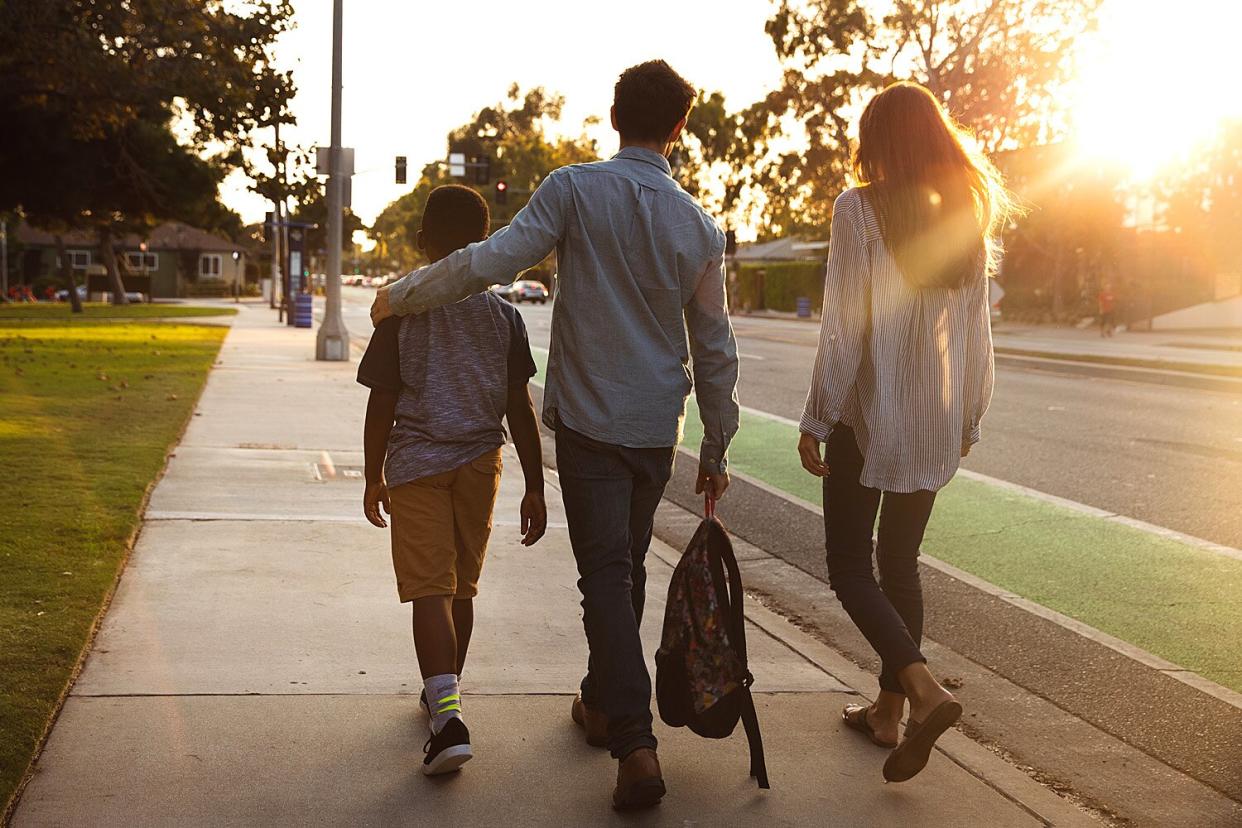
Getty Images
Becoming a parent is a major life change, and becoming an adoptive parent is no different. Every year, thousands of people choose this path to parenthood—in 2014 (the most recent year comprehensive data is available for) more than 110,000 children were available to adopt within the U.S.
These parents often experience an emotional roller coaster after their children come home, facing misconceptions about adoption, a lack of support, and unexpected parenting challenges.
So PEOPLE asked parents who have been through the process—whether through a private adoption of a newborn or an adoption of an older child out of the foster care system— to share their insights on what they wish they had known, what they want others to know, and what you should know if you're considering adopting, too.
RELATED: So You Want to Adopt? Here's Where to Start
Remember that parenthood is parenthood— no matter how a child comes to a family
When it comes to bringing a new child home, "there is really not much difference between being placed with a baby that just came out of your body and being placed with a person that didn't," explains Heron Greenesmith (who uses they/them pronouns).
Listen below to Me Becoming Mom to hear Jillian Michaels' adoption journey and her unique road to motherhood.
Greenesmith adopted their daughter out of the foster care system in 2016, at age 5. "There are developmental stages to a parent child relationship that I don't think can be shortcutted. Yes, we skipped diapers. We skipped daycare. We skipped preschool. We skipped the terrible twos. But developmental stages can replicate themselves with a new family unit."
To help understand their daughter's transitions, they say, "We would read baby books and be gobsmacked: 'Wait, she's going through this right now.' She had to develop an ego and a sense of self in relation to us, just like a [younger child] would."
Resist Preconceptions About Kids Who Have Been in Foster Care
It's tempting to tell parents who have adopted kids out of the foster care system how lucky their kids are to have found a loving family, but keep in mind that this isn't the child's whole story.
"We frame adoption as this incredible act that [the child] should be grateful for. But [as parents], that is just not what we see," says Greenesmith.
Any transition into a new environment can be jarring or even traumatizing, even if the adoptive environment is safer and more stable than the one the child left. (And it may not even be true that the child has been removed from an unsafe, unstable environment; "neglect" can apply to a parent who can't afford enough diapers for multiple changes a day, or who uses a recreational drug that's legal the next state over, and many advocate for assisting these parents rather than separating them from their children.)
Regardless of how positive the outcome, adoption is a visceral reminder that this child will never be reunited with their biological family.
"You can hold two thoughts in your head. You can love your child, and support them, and know what they need, and provide it for them. And you can also know that you are a representation of their loss," Greenesmith says.
November is National Adoption Month, and PEOPLE is celebrating by highlighting the many extraordinary ways families can grow via adoption, featuring real stories from celebrities, everyday parents and adoptees, as well as information on the varied ways to adopt. For more heartwarming, heartbreaking and happy-ending stories, visit our Adoption page.
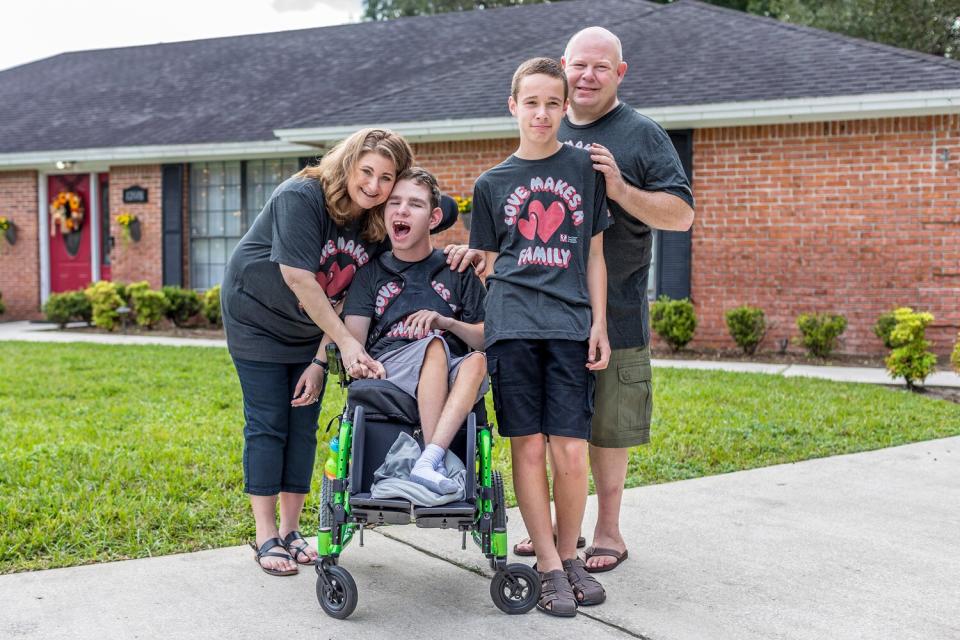
Dave Thomas Foundation for Adoption
Robbin Brydges, who adopted her sons Dalton (who has special needs) and Dawson from foster care when they were 9 and 7, agrees. "People come into this with this altruistic impression that they're going to save a child," she says. But it's not that simple: Providing a new loving family doesn't erase how difficult it can be to be separated from your family of origin.
Brydges took a creative approach to helping her son Dawson process his feelings around his biological family.
"We started a book that we wrote to each other and placed it under each other's pillow. He has asked me some big questions that I think he was nervous to ask out loud," she says. "It took the worry off him just to write it. I took my time when I responded to think about where he was coming from: where his heart and emotions were, what was going on to cause him to ask the questions. Then I answered him with honesty.".
RELATED: Thinking About Parenting an Older Kid in Foster Care? Here's What to Know
'Keep An Open Mind and Open Heart' About Every Family
Brydges' mantra reminds parents you can't have a specific outcome of what a family might look like in your mind. When she applied for her son Dawson, she was one of 75 potential parents who had submitted a request.
But Dawson wanted to be placed with his biological brother Dalton, who has cerebral palsy, epilepsy, is nonverbal, legally blind, quadriplegic and uses a wheelchair. The agency usually lists siblings together, but hadn't in this case because they thought separating the brothers might help Dawson find a family.
When they called Brydges to see if she and her husband would be interested in adopting both children, she was shocked: "Never in a million years did I think I was going to be a mom to a child with superpowers, but here I am!"
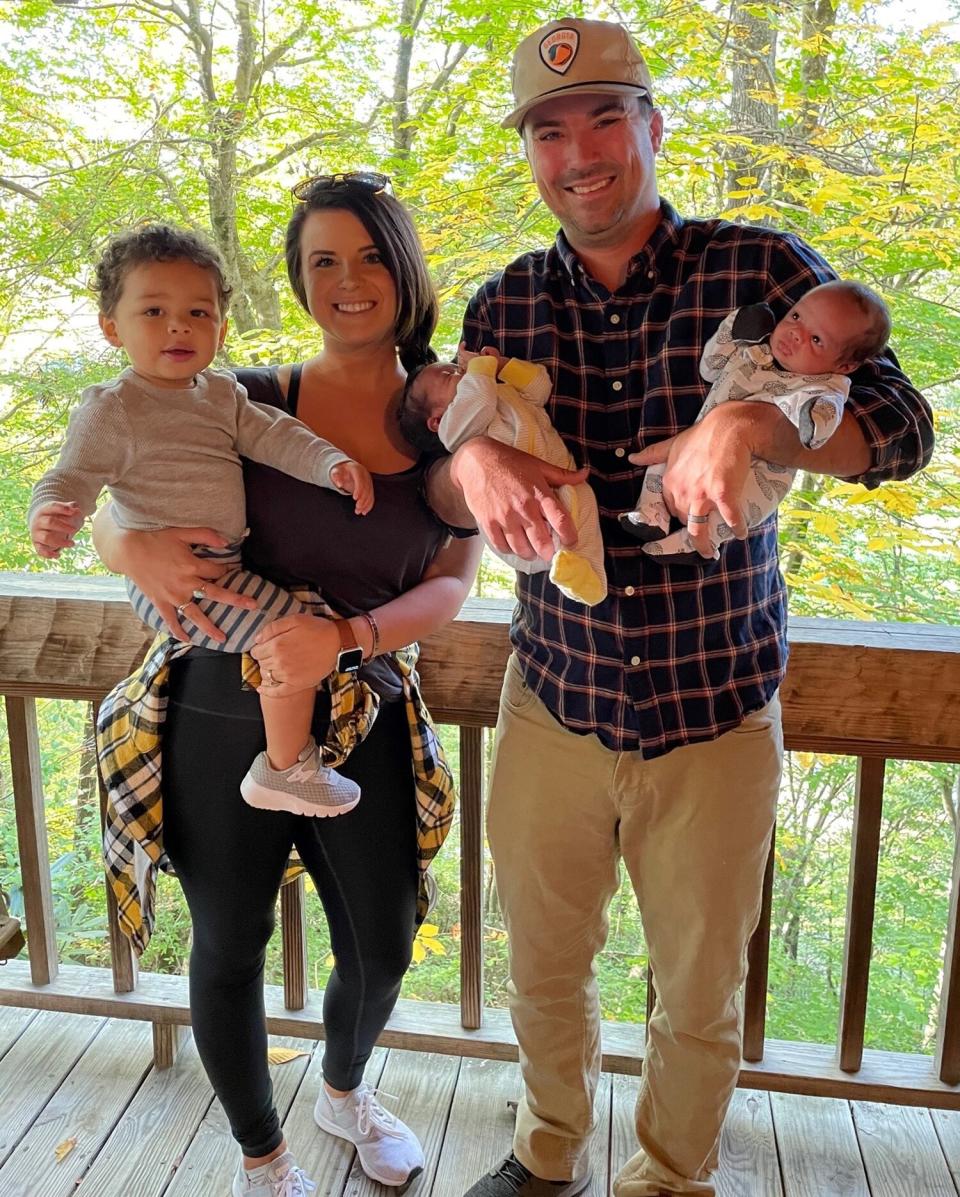
Courtesy Metcalf Family
Brett Metcalf also got a big surprise when he and his wife Megan adopted for the second time earlier this year— they had been expecting a singleton, but found out they were actually receiving twins after the babies were born.
"You have to let go of any and all control," he says. (The Metcalfs are also parents to an 18 month old who they adopted from birth in 2020.) Last minute rearranging of their nursery, running to Target to buy a second car seat— it was a humbling reminder of how little you can plan for when it comes to parenting. "We just had to trust that it was all going to work out."
Brydges also recommends not being too attached to particular titles (like "mom" and "dad") when adopting older kids who have connections to their biological families. When Dawson first asked what he should call her, "I said, you can call me whatever you want as long as you're polite and respectful," she says. "I knew he would call me Mom when I earned it."
It took about two months, she says, and Dawson has never looked back. But it doesn't work like this for everyone.
"[Our daughter] started calling us mom and dad instantly, but since then she's gone through a lot of iterations of not liking to call us that," says Greenesmith. What they call you is not a reflection of your bond, or your parenting.
RELATED: How to Prepare When Adopted Children Want to Meet Their Birth Parents
Put Yourself in the Kid's Shoes
It may seem like adoptive parents have done a superhuman amount of research on how to parent their kids, or were born with a sixth sense for understanding these complicated situations. But for Brydges, it was as simple as putting herself in the mindset of a child who has been in foster care.
"I kept thinking to myself: if I were a kid, how would I feel? Would I be afraid? Yes. Would I trust [me]? Probably not." She adjusted her actions accordingly, making sure her sons knew that promises would always be kept and their safety would always be paramount.
"When you think of children that were taken into foster care or who have gone through a traumatic event, their emotional growth is often 'stuck' [at the age they were when their trauma began]," she explains. "So even though my son was seven when we met, emotionally, some of the things he connected to seemed much younger, because that's where safety was for him. My gut told me I needed to connect to him at those levels first, to let him know I was a safe place."
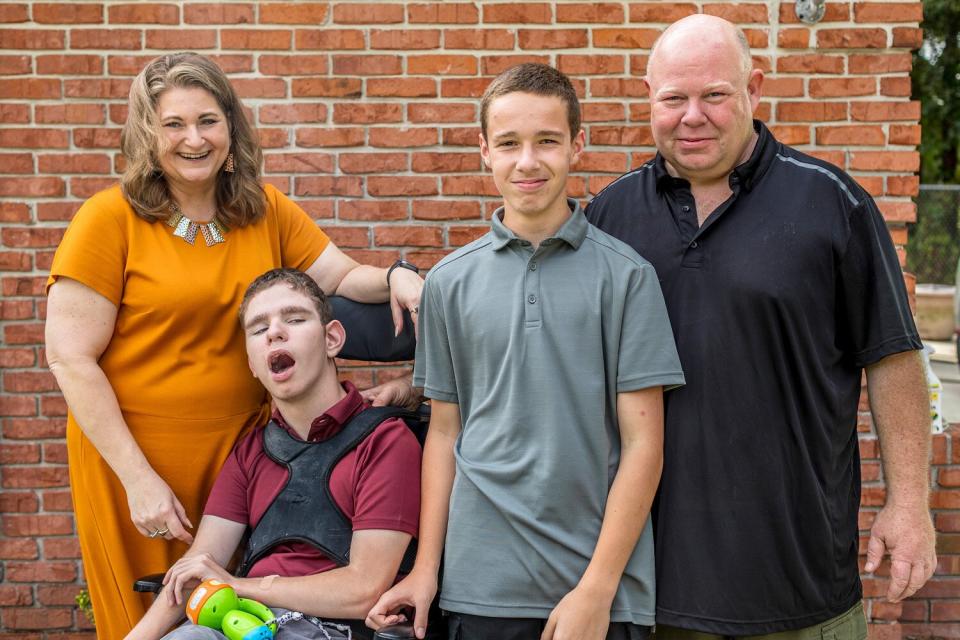
Dave Thomas Foundation for Adoption
If You Have Questions, Ask Those Who Have Been There
People who have experienced adoption (whether as parents or as adopted kids) can have great insight if you're looking for some guidance on what to say, not to say, or how to help.
"I have a friend who has a good relationship with her birth mom, and I asked her when she found out she was adopted," says Megan. "She was like 'I just always knew. We talked about it in our house, we read books about it.' That's what I want it to be like for my kids."
Based on her friend's advice Megan has already started to normalize the conversation by reading books to her children about being adopted, and she incorporates the boys' birth moms into their nightly prayers. Brydges also asked a friend who was adopted from foster care about how she felt, and to name the emotions she experienced after being adopted, to help Brydges anticipate how her boys may be feeling.
Greenesmith spoke to friends of theirs who had adopted, including people on their second or third adoption who they met in the 10-week-long state-sponsored class they attended with their partner. :"I had hours-long conversations with them, just asking anything I could think of. Like 'how do you know what they eat?' It was incredibly helpful."
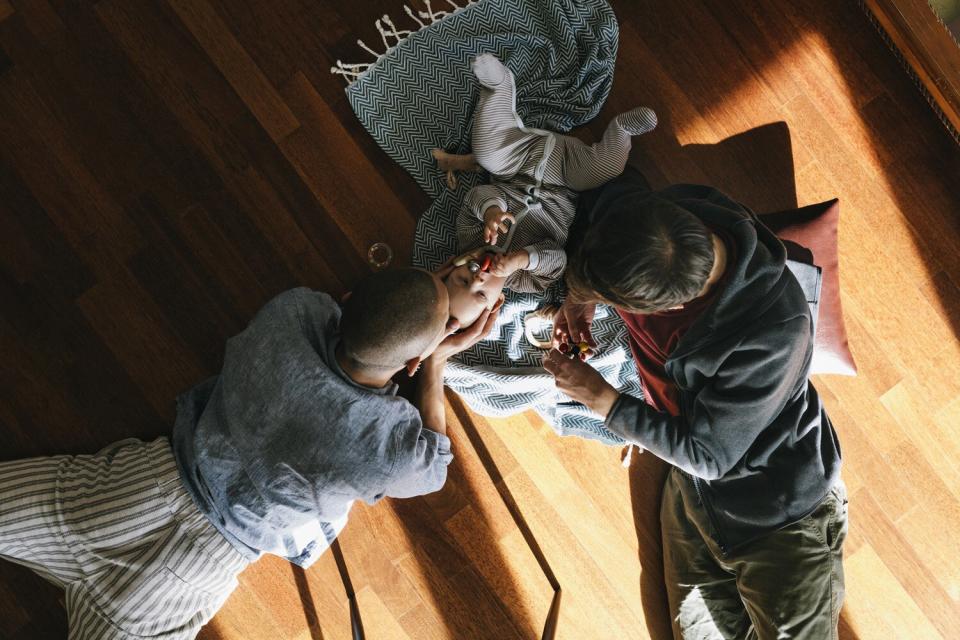
Getty Images
Help Adoptive Parents Seek Support, Wherever they Can Find It
New parenthood is overwhelming, so looking into nonprofit organizations that can assist with everything from the financial burden of adoption to providing logistical support is hugely helpful. Brydges worked with the Dave Thomas Foundation for Adoption, a nonprofit formed by Wendy's founder Dave Thomas that focuses on facilitating foster care adoption. "They were phenomenal," she says. "I could not have asked for better people. Our learning curve to parenthood was like a telephone pole— it was going straight up, and we couldn't stop. They helped me connect the dots and pieces when we needed it."
For those seeking private adoption of a newborn, the price tag can be prohibitive — about $35,000 to start. To offset the costs, the Metcalfs applied for adoption grants and received $4,000 from Gift of Adoption Fund. In addition to their grant, the Metcalfs applied for and received an interest-free adoption loan, and they did some fundraising on their own, including hosting a yard sale where friends and neighbors donated items that the Metcalfs could sell.
"We had strangers stopping by saying 'I don't have anything to donate, but here's some money.' We made over $7,000 in one day," says Brett. "We were blown away." It might be hard to reach out and ask for help, but for the dream of bringing a child into your family, Brett says it's worth it: "It's a vulnerable place to be in, but people really do want to help."
Whenever Possible, Make a Connection with the Birth Family
Open adoption— where the birth family and the adoptive family have the ability to remain in contact— has benefits for everyone. Research has found that open adoption leads to fewer behavioral problems, better emotional adjustment, more positive identity formation, and higher self-esteem in adoptees.
"At first, I wanted a closed adoption," says Megan. "That's my baby, you know? I didn't want to share that. But I learned why open adoption is good for the kids," she says, thanks to information provided by the agency she and Brett worked with. It was persuasive, and a FaceTime call with her oldest son's birth mother confirmed that she'd made the best decision: "She said she was seeing exactly what she wanted for him," Megan says. It them both feel confident in their choices.
Maintaining that connection also means holding space for however the child feels about their birth family, not how you feel about them. "Never, ever speak ugly at any time— to anyone— about their biological family," says Brydges. "Young ears are always listening. You speaking ugly about their bio family hurts them just as if you were saying those words about them."
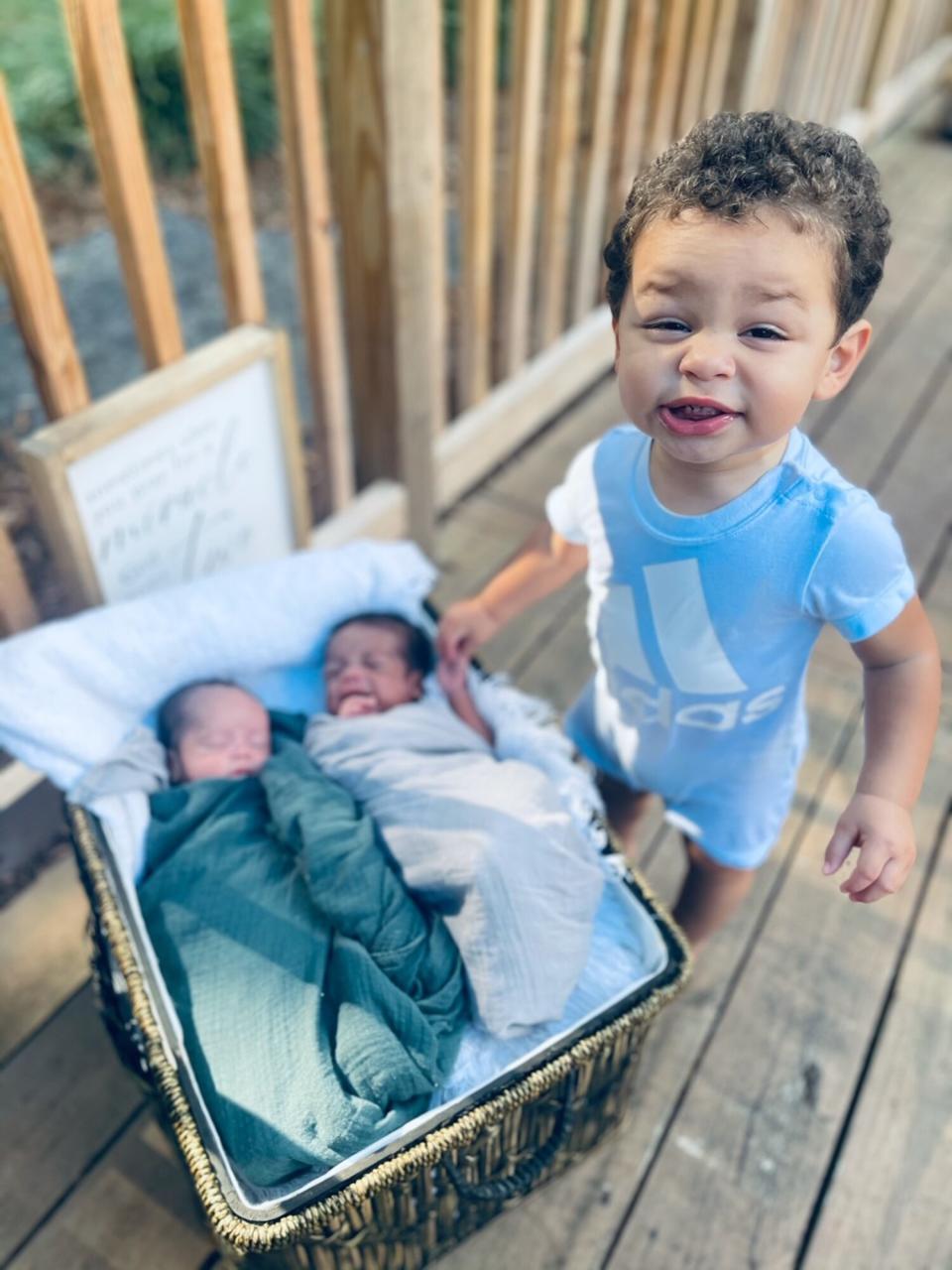
Courtesy Metcalf Family
Think Before You Speak
People who mean well often say insensitive things, and adoptive parents can be on the receiving end. Megan, who dealt with infertility before their family's adoptions, felt hurt when people would make comments like "Oh, I bet you'll get pregnant naturally now that you've adopted."
"You almost get a feeling [when people say that] of, like, Oh, are they not enough?" she says. "I cannot even fathom loving a child more than we love all our boys."
Another common "fear" adoptive parents often hear from their friends and family is that their parenting journey will automatically be harder because of the risk that they will get a "bad" kid.
"There were people who were very worried about this for us," says Greenesmith. "I would say to them: What if I got a 'bad' bio kid? Are there bad kids? Our job as parents is to help them be people in the world."
Brydges also heard variations on this theme, with people expressing concern for her because of Dalton's physical disabilities. "It would drive me bananas to hear someone say 'You know, it will be a lot of work,'" she says. "I understood that our lives would be forever changed having our boys. They could only see the challenges and effort. All I could see was the love."
Ultimately, protecting kids from these off-base judgements may mean keeping parts of their story private. "I do not and will not discuss with anyone the conditions of my son's births," says Brydges, referring to the circumstances that caused Dawson and Dalton to be removed from their birth family. "No one needs to know that."
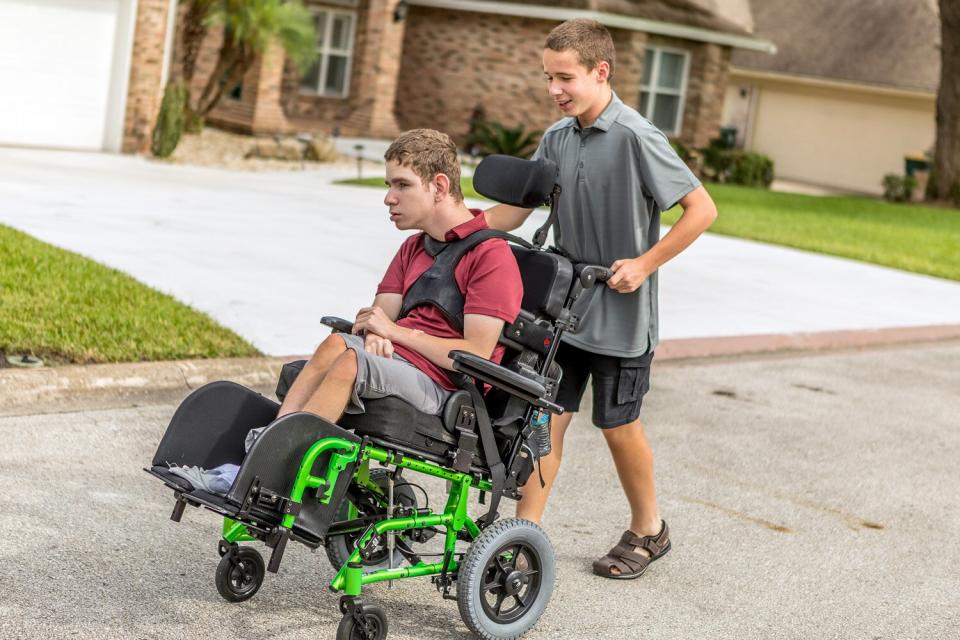
Dave Thomas Foundation for Adoption
Stand up when people say insensitive things
For kids who have physical differences from their parents, Brydges advises getting out in front of it. "Don't ignore people's ignorance towards your child," she says. "Think about it, can you feel when someone is staring at you? How do you feel? How would you handle it? Then think of a child. They can feel it too, and they also know that their protector let it happen and did not make it stop. Our job is to educate," she says. She says she'll often say something like "I can't help but stare at him, too—all these good looks in one place! My son's name is Dalton. What's your name?" to encourage conversation.
The Metcalfs' sons are biracial, and as white parents they have begun researching how to handle questions from onlookers as the boys age. In fact, their adoption agency, a local North and South Carolina group called Christian Adoption Services, gave them resources including sample scripts that detail how to react to various difficult situations, like if someone comments about the children looking different from them or, god forbid, says something racially insensitive.
Megan also joined a Facebook group, Shades of Love, for children with natural hair textures whose parents are unfamiliar with caring for their hair type. Of course, there's no way to protect your child fully from all the ignorance they may face, but by being proactive you can be prepared as best as possible.
Support the adoptive families in your life
Really, the best thing you can do is be there for people who have adopted. "What would have helped our mental health was robust support," says Greenesmith. "We don't need pity. What we need most is time off."
What's much better is being present and helpful. "Come to my house and make me tea and take the kid out for five minutes," they suggest. "We all need a tradition of support."

